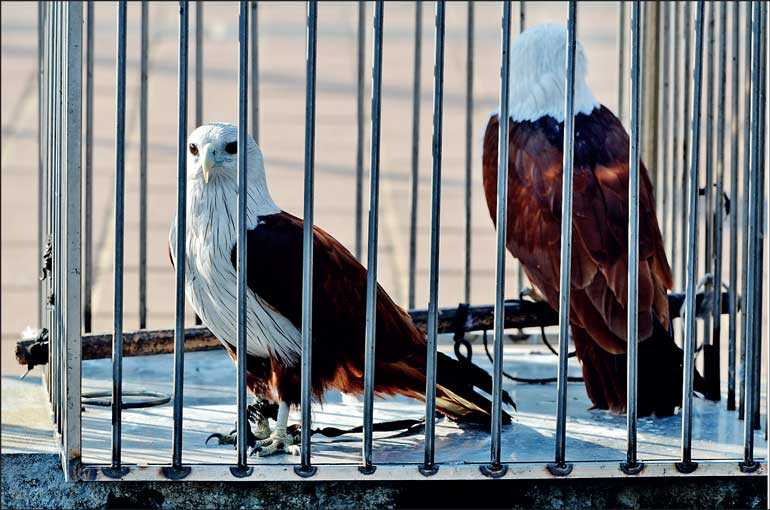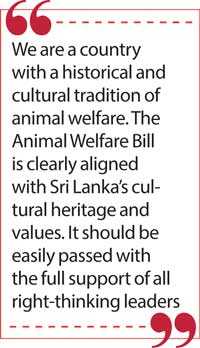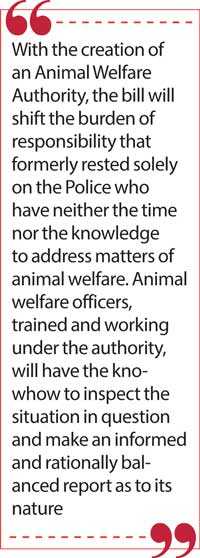Monday Feb 16, 2026
Monday Feb 16, 2026
Friday, 1 February 2019 00:00 - - {{hitsCtrl.values.hits}}

As a veterinary practice, we at Pet Vet Clinic absolutely believe that animal welfare should be at the core and heart of all that we do as veterinarians and para-veterinary professionals. As such, we unequivocally believe that it is of utmost importance that the draft of the Animal Welfare Bill finalised in late 2017 be passed in Parliament in a timely manner. This is an urgent requirement as it has already been delayed for many years. 
Veterinarians and veterinary support staff across the world, not only in Sri Lanka, have an important responsibility in recognising and promoting the essential role of animals in society, not only as pets but also working animals, production animals, etc. We veterinarians are their voice – at times their only voice – and their professional representation. It is our duty to ensure they live comfortable lives, free from fear and pain.
The relationship between animals and people is specially highlighted in the role pets play as human companions. Many studies and high-quality research show a variety of benefits, both physiological (reduced blood pressure, etc.) and psychological (stress reduction, etc.). Animals as companions are important for human wellbeing, more so in modern society where interpersonal bonds are often challenging to establish and sustain. Pets fill this space, providing friendship and emotional comfort. This is especially so with the elderly as well as children – special needs children in particular, as pets provide mental stimulation and support.
Our Sri Lankan culture, and in fact most world religions, understand the importance of compassion towards animals for human wellbeing. Many Sri Lankans are fundamentally good to animals or at least won’t purposefully harm them. Many less obvious forms of animal cruelty in Sri Lanka occur due to lack of knowledge about animal needs. For example, clearly loved pets who are kept in tiny kennels, pets forcibly taken into rivers or the sea for a bath even when they are obviously terrified, lack of correct quality and quantity of food needed based on the animal species. This requires a good balance between education and regulations. The Animal Welfare Authority proposed in the bill can and should address this.
There are clearly exceptions and incidences of absolute cruelty are not as uncommon as we think. The case of Charlie, the Labrador that was set on fire whilst in its outdoor kennel on New Year’s Eve, succumbing to its injuries the next day, that made the news recently is not a one-off incident. 
This is just an example of a tendency to take out one’s anger by harming a person’s pet or an animal. People do this with a clear awareness that this is a more painful and horrendous revenge than directly harming the person concerned. This is the same idea as threatening a person’s family and loved ones.
The cornered leopard that was brutally beaten to death with the attendant victory celebrations filmed last June is another example of obvious cruelty. There is an extensive body of evidence that those who show such cruelty to animals also show similar cruelty towards people.
One leads to another. Both situations are equally unacceptable in society and should be equally punishable. The 2017 draft of the Animal Welfare Bill will render behaviour of this nature illegal, allowing for the investigation, prosecution and adequate punishment that will also act as a deterrent.
Animals are an integral part of a healthy lifestyle and healthy planet. They demonstrate the importance of respecting and coexisting with other species and our environment. There are many examples where animals sacrifice their life for our benefit, from police and service dogs who have died defending their handlers to farm animals we use for food.
Protein malnutrition is a common and serious problem in developing countries. Adequate, affordable, high-quality protein is important to human nutrition. Animals make this ultimate sacrifice – of their lives – for our benefit. Thus it is our duty to ensure their short lives are comfortable and their death is fear and pain free. The Animal Welfare bill provides for the examination of production practices which, taken in consideration with economics and supply, will lead to a fair and balanced compromise.
With the creation of an Animal Welfare Authority, the bill will shift the burden of responsibility that formerly rested solely on the Police who have neither the time nor the knowledge to address matters of animal welfare. Animal welfare officers, trained and working under the authority, will have the knowhow to inspect the situation in question and make an informed and rationally balanced report as to its nature. 
The lack of such continues to be a serious concern in attempting litigation of animal welfare cases. The bill also looks at emerging problems in Sri Lanka such as poaching and trading of animals for food, ivory, skins and furs, etc., which have been steadily increasing with the developing tourist trade and globalisation in general.
A lot of input from a variety of quarters, be they activists, veterinarians, livestock producers, or the Department of Animal Production and Health, has gone into the creation of this bill over the past years. It covers the full spectrum of animal welfare, be they wildlife, captive animals, laboratory animals, street animals, livestock or working animals.
There is absolutely no reason to fear this bill as it is a reasonable and moderate document that has taken into account the voices and concerns of anyone and everyone with an interest in animals, with the promise of being effective in the long run. The longer we delay passing this Animal Welfare Bill, the longer the highly ineffectual Cruelty to Animals Ordinance of 1907 and Animals Act No. 29 of 1958 remain in effect.
We are a country with a historical and cultural tradition of animal welfare. The Animal Welfare Bill is clearly aligned with Sri Lanka’s cultural heritage and values. It should be easily passed with the full support of all right-thinking leaders. As Mahatma Gandhi said, “the greatness of a nation can be judged by the way its animals are treated”.
[Dr. Nalinika Obeyesekere has a BSc in Wildlife from University of California, Davis; a BVSc from University of Peradeniya; and an MVS (Distinction) from Murdoch University, Australia. She is also a Fellow of the Ashoka Trust and of the Sri Lanka College of Veterinary Surgeons (FSLCVS). Dr. Obeyesekere has been presented the prestigious awards for One Medicine One Health (2015) and Companion Animal Welfare (2018) by the World Small Animal Veterinary Association (WSAVA). She is a Founder and Director of Pet Vet Clinic, a full-service veterinary hospital based on a unique multi-doctor model and an absolute love for animals. Pet Vet continuously strives to learn and improve the quality of veterinary diagnosis, medicine and surgery in a holistic manner and to champion the all-important pet-people bond.]